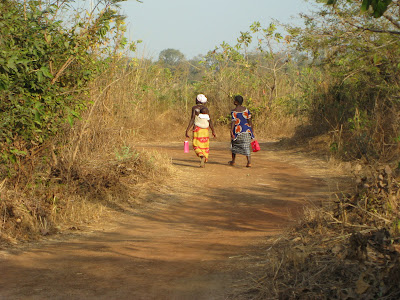Guinea-Bissau, on the Atlantic coast of West Africa, has a swampy coast, with forests changing to grasslands in the east. Guerrilla warfare liberated a mix of ethnic groups from Portuguese rule in 1974. In 1994 the country's first multiparty elections were held. An army uprising four years later led to a bloody 1998-99 civil war, which caused severe damage to the nation's infrastructure. Political instability continued with a military coup in 2003. Guinea-Bissau is among the world's least developed countries, with most people engaged in subsistence agriculture and fishing -- cashew nuts are the main export crop. —National Geographic Atlas of the World, Eighth Edition, 2004
Having visited a place that is among the poorest and least developed in the world, how can I now simply return to my extravagant life of luxuries and turn the page as if closing a last chapter of an interesting book and moving to the next story? How can I continue to indulge my voracious American appetite for material possessions and creature comforts that are unprecedented in the history of the world? How can I close my eyes to such glaring needs while pandering to my desires for more, more, more?
There is something slightly romantic about the stories I have written, as if it were all just one great adventure with a happy ending. But the truth is that there is no happy ending for most of the people in the villages I visited. Apart from a personal relationship with their Creator, each baby girl born in that little corner of the world will spend her life struggling for survival while submitting to the demands of evil spirits, and then eventually die and enter an eternity separated from God forever. Those demons, whose agenda, according to the Bible, is to steal, kill and destroy, will have had their way in her life on earth, and then will accomplish their ultimate goal when she no longer has the opportunity to hear the Good News that she is loved and cherished by a Heavenly Father. In this life she will at least have the blessing of the sunrises and sunsets, a drink of water on a thirsty tongue, flowers in bloom, birds singing, crops growing, animals giving birth, and the closeness of her children. She will have none of that in the next life. If this life, with all its difficulties from extreme poverty, is strenuous and grueling for these women, it will seem like a joy ride compared to the life to come where, for all eternity, there will be no blessings. None. Zero. No sun, no rain, no birth, no plants, no animals, no food, no love, no relationships, nothing at all that could bring a drop of comfort.
What can I do? I can't do much, but that doesn't mean I can't do anything. Something is better than nothing. The Bible tells me that to whom much is given much is required, and I see now better than ever before just how much I've been given, and therefore I know that it is required of me to do something. The men of Guinea Bissau and other similar developing countries are just as needy as the women, but it is to the women and children that my heart is drawn. The needs of my own children have been one of my highest priorities since the day they were born. The needs of other children that I have personally known have captured my attention and often stirred me to respond with some kind of help. The only difference between them and the needy children on the other side of the world, though they are no less valuable in God's eyes than the children under my own roof, is that they have been out of sight and so I could keep them from pestering my conscience. But now all that has changed. A picture may be worth a thousand words, but an experience is worth ten thousand pictures.
In considering the vast array of needs, it is impossible for me to prioritize other than putting the need for Jesus at the top of the list, and then everything else in a big needy lump below that. But even though the other needs come second in importance to the need for Jesus, the other needs are just as real. A thirsty person needs water; a hungry person needs food; and a person who is heading for eternity without Jesus needs the Good News so they can at least make an informed choice.
Somewhere in there I can make some kind of a difference for someone. Not being able to make all the difference for everyone is no excuse.
I don't know the answer to my own question, "So now what?" The only thing I know for sure is that I will never be the same, and my heart is drawn to do more by returning to this place with Phase Two: Women and Children, whatever that looks like. My ears are on high alert to hear from God because I want to go Where He Leads.

















































